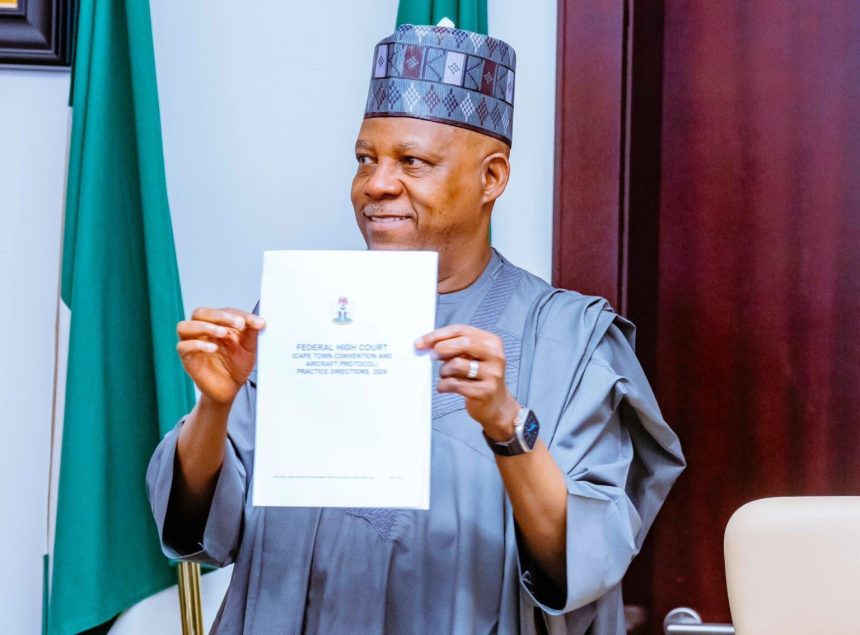The federal government has officially signed the Cape Town Convention (CTC) practice direction to enable domestic airline operators to access aircraft on dry lease.
The signing, which took place on Thursday at the presidential villa in Abuja, was presided over by Vice-President Kashim Shettima and witnessed by aviation stakeholders, including Allen Onyema, Air Peace chairman.
The milestone, which comes 20 years after the treaty’s inception, was signed by John Tsoho, chief judge of the federal high court, during a stakeholders’ meeting of the Presidential Enabling Business Environment Council (PEBEC) chaired by Shettima.
Read Also: Terrorists block Gusau-Funtua Highway, abduct travellers in Zamfara
The Cape Town accord aims to enhance asset-based financing and leasing of aviation equipment, including aircraft, thereby expanding funding opportunities and reducing costs for airlines.
With the agreement, Nigerian airline operators are expected to gain access to aircraft on dry lease, which could lead to lower flight rates for passengers.
Dry lease is an arrangement which involves hiring an aircraft without a flight crew. The hiring entity (the lessee) takes on operational responsibilities, such as crew members and maintenance.
In a statement on the development, Stanley Nkwocha, vice-president’s media aide, said the treaty would resolve the problem of obtaining certain and opposable rights to high-value aviation assets such as airframes, aircraft engines, and helicopters which have no fixed location.
“The signing of the CTC Practice Direction will ensure the Cape Town Convention becomes fully operational in Nigeria, thereby reducing the cost of insurance for airlines, restoring investors’ confidence in the Nigerian aviation sector, and reducing the cost of doing business in the nation’s aviation sector,” he posted.
On April 8, Festus Keyamo, minister of aviation and aerospace development, had said the federal government was working on a practice direction that would enable domestic airline operators to hire aircraft on dry lease.
According to Keyamo some local operators had, in the past, breached the CTC which regulates aircraft leasing across the world.
This, he said, had forced the Aviation Working Group, co-chaired by Airbus and Boeing, to blacklist Nigeria until it implements a law that would prevent such occurrences.
“Why we cannot compete with big international airlines is because we don’t have access to aircraft on the same terms as they have. People don’t know that the best airlines in the world run their fleet 100 percent based on actual purchase of aircraft,” the minister had said.
Keyamo said recent studies showed that 70 percent of the fleet across the world is on dry leases.
Also, on August 17, the Nigeria Civil Aviation Authority (NCAA), had said the federal government was working to make the acquisition of aircraft easier for local airlines.
Chris Najomo, the acting director-general (DG) of NCAA, said the minister had been in discussions with companies like Boeing and Embraer to facilitate dry leasing for Nigerian airlines.






